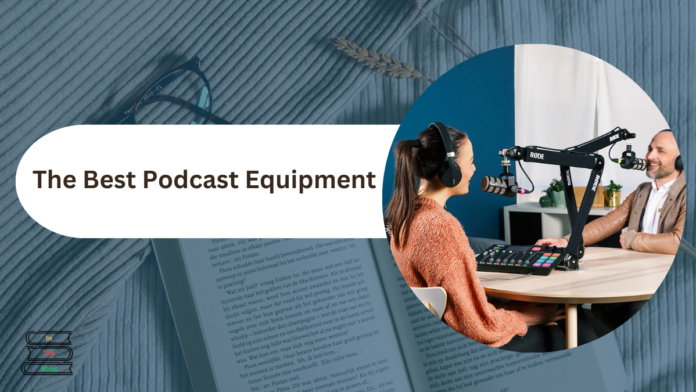Podcasting continues to grow in popularity, and having the right podcast equipment is important for producing high-quality audio content. Whether you are a beginner or a seasoned podcaster, investing in the right gear can make a significant difference.
Here is an article to the best podcast equipment for 2024, including recommendations for various budgets and needs.
Contents
- Microphones
- Audio Interfaces
- Mixers
- Headphones
- Microphone Stands
- Pop Filters
- Digital Audio Workstations (DAWs)
- Recording Remote Interviews
- Memory Cards
- Portable Recorders
- Digital Audio Workstations (DAWs)
- Boom Arms and Stands
- Acoustic Treatment
- Lighting
- Conclusion
- Some Questions
- What is the best microphone for beginners in podcasting?
- Do I need an audio interface if I have a USB microphone?
- What are the advantages of using a mixer for podcasting?
- Why are headphones important in podcasting, and which ones are recommended?
- What software is best for editing podcasts?
Microphones
Microphones are the heart of your podcast setup. Choosing the right one can significantly impact the quality of your recordings:
- Blue Yeti: A popular USB microphone that has great sound quality for beginners. It is easy to use and versatile, making it a solid choice for new podcasters.
- Shure SM7B: A dynamic microphone known for its professional sound quality. It is a staple in many recording studios and is perfect for podcasters looking to upgrade. Note that it requires an audio interface and a preamp.
- Audio-Technica AT4040: A condenser microphone offering excellent versatility and high-quality sound, suitable for more advanced podcasters.
Audio Interfaces
Audio interfaces are important for podcasters using XLR microphones, as they convert analogue signals to digital ones:
- Focusrite Scarlett 2i2: Highly recommended for its reliability and quality. It is user-friendly and perfect for both beginners and professionals.
- Zoom H6: A portable option that doubles as a recorder and an audio interface. It is excellent for podcasters who travel or record in various locations.
Mixers
Mixers can enhance your podcasting setup by providing more control over your audio:
- Behringer Xenyx 802: A budget-friendly mixer that has important features for beginners.
- Rode RODECaster Pro: Designed specifically for podcasters, it includes features like programmable sound pads and phone call recording, making it a premium choice for serious podcasters.
Headphones
Good headphones are important for monitoring your recordings and ensuring sound quality:
- Sony MDRZX110: Budget-friendly headphones that provide clear audio.
- Audio-Technica ATH-M50x: Known for superior sound quality and comfort, making them ideal for long recording sessions.
Microphone Stands
A stable microphone stand is important to reduce unwanted noise and maintain consistent audio quality:
- On-Stage DS7200C: A simple, budget-friendly desktop stand.
- Rode PSA1: A high-quality swivel mount boom arm that has excellent durability and adjustability.
Pop Filters
Pop filters help eliminate plosive sounds, ensuring clearer audio:
- Aokeo Professional Microphone Pop Filter: An affordable and effective option.
- Stedman Proscreen XL: A higher-end pop filter known for its durability and performance.
Digital Audio Workstations (DAWs)
DAWs are software used for recording, editing, and mixing your podcast:
- Audacity: A free, open-source option that’s great for beginners.
- Adobe Audition: A professional-grade DAW with advanced features that are suitable for experienced users.
Recording Remote Interviews
Recording remote interviews requires reliable software to ensure high-quality audio and video:
- Riverside.fm: It has full-fidelity audio and up to 4K video recording, making it ideal for remote podcasting.
Memory Cards
Memory cards are important for portable recorders like the Zoom H6:
- SanDisk Ultra SD cards: Provide ample storage at an affordable price.
- Samsung EVO Plus microSD card: has larger capacity and faster data transfer for more demanding needs.
Portable Recorders
Portable recorders are great for podcasters who need flexibility and the ability to record on the go:
- Zoom H5: Known for its versatility and high-quality recordings, the Zoom H5 is perfect for field recordings and interviews.
- Tascam DR-40X: Another excellent portable recorder, offering great sound quality and multiple recording modes.
Digital Audio Workstations (DAWs)
DAWs are software programs used for recording, editing, and mixing your podcast:
- Audacity: A free, open-source DAW that’s great for beginners. It has all the basic features you need to get started.
- Adobe Audition: A more advanced DAW with comprehensive features for professional editing and mixing.
Boom Arms and Stands
Boom arms and stands keep your microphone stable and positioned correctly:
- Rode PSA1: A high-quality boom arm that’s durable and adjustable, perfect for maintaining optimal microphone placement.
- On-Stage DS7200B: A budget-friendly desktop stand that’s sturdy and reliable.
Acoustic Treatment
Acoustic treatment helps reduce echo and background noise in your recording space:
- Auralex Acoustics Studiofoam Panels: These panels are effective in controlling sound reflections and improving recording quality.
- ATS Acoustics Panels: High-quality acoustic panels that help create a better recording environment by absorbing sound.
Lighting
Good lighting is important if you’re recording video podcasts or streaming live:
- Elgato Key Light: Provides adjustable and high-quality lighting, making you look professional on camera.
- Neewer Ring Light Kit: A more affordable option that still has great lighting for video recordings.
Conclusion
Investing in the right podcast equipment can greatly enhance your production quality and make the podcasting process more efficient and enjoyable.
Whether you are just starting out or looking to upgrade your current setup, these recommendations cover a number of budgets and needs, ensuring you can find the perfect gear for your podcasting journey.
Some Questions
What is the best microphone for beginners in podcasting?
The Blue Yeti is highly recommended for beginners due to its ease of use and excellent sound quality. It is a USB microphone, so it connects directly to your computer, eliminating the need for an audio interface.
Do I need an audio interface if I have a USB microphone?
No, you do not need an audio interface if you use a USB microphone like the Blue Yeti. However, if you are using XLR microphones, an audio interface like the Focusrite Scarlett 2i2 is important to convert the analogue signal to digital.
What are the advantages of using a mixer for podcasting?
A mixer, such as the Rode RODECaster Pro, provides more control over your audio levels, allows you to mix multiple audio sources in real-time, and can add effects. It is particularly useful for live broadcasts and multi-person podcasts.
Why are headphones important in podcasting, and which ones are recommended?
Headphones are crucial for monitoring your audio in real-time, ensuring there are no issues with sound quality during recording. Audio-Technica ATH-M50x is highly recommended for its superior sound quality and comfort, especially during long recording sessions.
What software is best for editing podcasts?
Audacity is a great free option for beginners, offering a number of basic editing tools. For more advanced features, Adobe Audition is a professional-grade Digital Audio Workstation (DAW) that provides comprehensive editing, mixing, and mastering capabilities.
Read More:
- Digital Security and Gambling: Protecting Yourself in Online Spaces
- The Key to Optimizing Your IT Asset Workflow
- Noise-Cancelling Headphones: Immersive Listening at Its Best
- Why Every College Student Needs to Be Aware of Their Online Privacy
- Which Big Data Technologies Help Online Casinos Predict Player Behaviour

Chandler is an avid automobile enthusiast who is passionate about all things on wheels. From the latest car models to classic vintage rides, I love exploring the automotive world’s intricate details and engineering marvels. With years of experience in test-driving, reviewing, and analyzing cars, I provide readers with comprehensive insights and honest opinions.



























